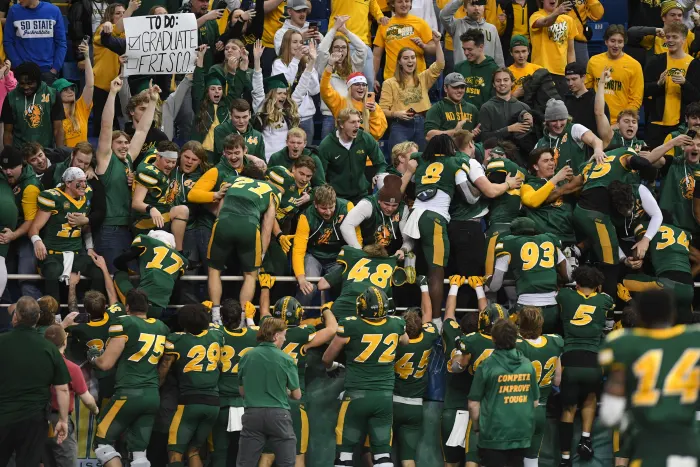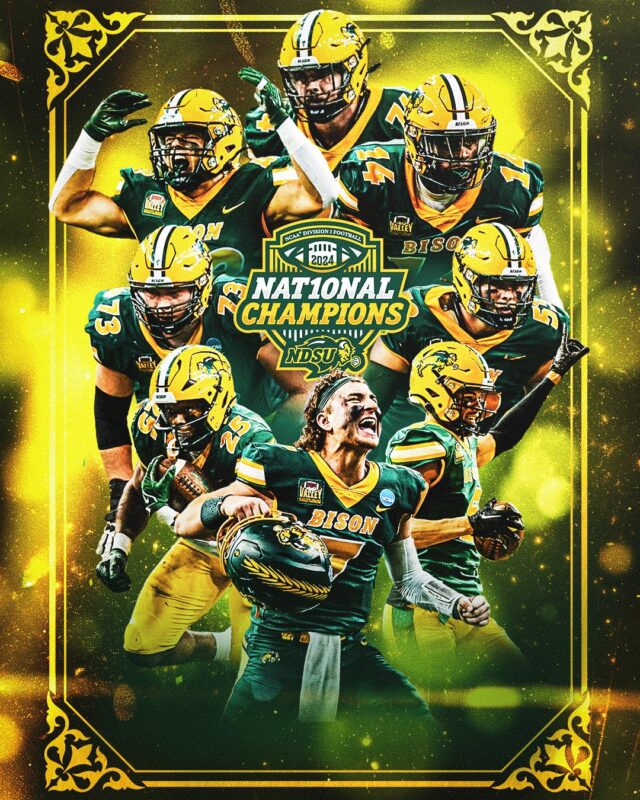News
North Dakota State Claims 10th National Championship Behind Minnesotan-Filled Roster
North Dakota State University (NDSU) has once again proven why it is a dominant force in college football. On Monday night, the Bison secured their 10th national championship at the Division I Football Championship Subdivision (FCS) level, defeating Montana State 35-32 in an electrifying matchup. This victory not only adds to NDSU’s storied legacy but also highlights the critical contributions of their Minnesota-based players.
The Bison’s Road to Glory: Dominance in FCS Football
Since the inception of the FCS in 1978, no program has matched NDSU’s level of success. With 10 national titles since 2011, the Bison have firmly cemented themselves as the class of the FCS. For comparison, the next closest program in terms of championships has six titles.
Their 2024-25 championship win wasn’t without challenges. Despite turnover within the coaching staff and fierce competition from teams like Montana State and South Dakota State, NDSU continued to rise to the occasion. Monday’s victory is a testament to their resilience, talent, and unwavering determination.
Key Game Highlights
NDSU’s championship performance was driven by their offense, led by quarterback Cam Miller and standout receivers from Minnesota. Miller delivered a near-flawless game, completing 19 of 22 passes for 200 yards and two touchdowns, while also rushing for 121 yards and two additional scores.
Minnesota’s Bryce Lance stood out as the team’s leading receiver with 9 catches for 108 yards and a touchdown. Former Lakeville North standout Raja Nelson also contributed with 5 catches for 52 yards, reinforcing Minnesota’s pivotal role in NDSU’s success.
A Strong Pipeline: Recruiting from Minnesota
One of the hallmarks of NDSU’s program has been its exceptional recruiting pipeline from Minnesota. This season’s roster featured 39 Minnesotans, underscoring the state’s critical contribution to the Bison’s dynasty.
Profiles of Key Minnesotan Players
- Bryce Lance (Marshall, MN): NDSU’s leading receiver, Lance showcased his skills throughout the season and particularly in the championship game. His game-high 108 yards and critical touchdown exemplified his importance to the team.
- Eli Mostaert (Lakeville, MN): Anchoring the defensive line, Mostaert’s relentless effort was instrumental in stifling Montana State’s potent offense.
- Hunter Zenzen (Barnesville, MN): A defensive standout, Zenzen contributed key stops that helped secure the narrow victory.
The Impact of Minnesota Talent
The Minnesotan presence is not just about numbers—it’s about quality. Players from Minnesota have consistently stepped up in high-pressure situations, contributing both offensively and defensively. This recruitment strategy has been a cornerstone of NDSU’s sustained success, setting them apart from other FCS programs.
“Year after year, our Minnesota players are a critical part of what makes this team special,” said NDSU head coach Tim Polasek. “Their work ethic, skill, and dedication are unmatched.”
A Program of Excellence: 10 Titles in 14 Years
Winning 10 national championships in 14 seasons is a feat rarely seen in any sport. This dominance is not just about talent on the field—it reflects a culture of excellence that permeates the entire program. From meticulous preparation to adapting through adversity, the Bison have mastered the art of winning.
Coaching Leadership: Tim Polasek’s First Title
This championship marked Tim Polasek’s first national title as head coach, following his appointment in 2023. Polasek took over from Matt Entz and has already made a significant mark on the program. He now joins the ranks of legendary NDSU coaches who have brought championships to Fargo.
Overcoming Challenges: The Path to Victory
The 2024-25 season wasn’t without hurdles. Montana State, boasting a perfect 15-0 record heading into the championship, posed a formidable challenge. Despite this, NDSU’s balanced offense and gritty defense ensured victory.
Key factors in overcoming Montana State included:
- Cam Miller’s versatility: A dual-threat quarterback who excelled both through the air and on the ground.
- Clutch defensive stops: Led by Minnesotans like Eli Mostaert and Hunter Zenzen, the Bison defense held strong when it mattered most.
- Special teams’ efficiency: Flawless execution in critical moments.
Is It Time for the Bison to Move to the FBS?
As the Bison continue to dominate the FCS, the question of whether they should transition to the Football Bowl Subdivision (FBS) grows louder. With programs like Georgia Southern and Appalachian State successfully making the jump, many wonder if it’s time for NDSU to follow suit.
Is It Time for the Bison to Move to the FBS?
As North Dakota State continues to dominate the FCS, questions about the program’s future have become increasingly relevant. The Bison’s sustained success, coupled with the rise of programs like Georgia Southern, Appalachian State, and James Madison in the Football Bowl Subdivision (FBS), has fueled speculation about whether NDSU should make the jump to college football’s highest level.
Pros of Moving to the FBS
- Increased Visibility and Competition
Transitioning to the FBS would give NDSU the opportunity to compete against powerhouse programs like Alabama, Ohio State, and Clemson. This exposure would attract higher-caliber recruits and solidify NDSU’s reputation as a premier football program. - Enhanced Revenue Opportunities
Moving to the FBS could open the door to larger television contracts, more lucrative sponsorships, and bigger attendance figures for home games. Bowl game payouts in the FBS, even at the Group of Five level, far exceed those of FCS playoffs. - Building on an Established Legacy
With 10 national championships since 2011, the Bison have little left to prove in the FCS. A move to the FBS could be seen as the next logical step for a program that has already established itself as a dynasty.
“We’ve shown year after year that we can compete with the best,” said head coach Tim Polasek. “The question isn’t whether we’re ready; it’s about finding the right opportunity to make the jump.”
Cons of Leaving the FCS
- Potential for Growing Pains
While NDSU has dominated the FCS, competing in the FBS presents a different level of challenge. There’s a risk that the program could struggle initially against larger, more established programs. - Impact on Tradition
The FCS playoffs have been a hallmark of NDSU’s legacy. Moving to the FBS would mean forgoing the playoff system in favor of bowl games, which might not resonate as strongly with the school’s fanbase. - Geographic and Conference Challenges
Finding the right conference could be difficult. Regional proximity, travel costs, and alignment with like-minded schools would all need to be considered. Conferences like the Mountain West or MAC could be options, but none offer the perfect fit.

NDSU players celebrate their hard-fought victory over Montana State.
What’s Next for NDSU?
For now, NDSU remains the undisputed king of the FCS, but the lure of the FBS continues to grow. A move would not only challenge the program but also redefine its future. Whether the Bison decide to stay or go, the legacy of their dominance in the FCS is secure.
Conclusion: A Dynasty with Endless Potential
North Dakota State’s 10th national championship is a reminder of their unparalleled success in college football. Whether they choose to remain in the FCS or move to the FBS, the Bison have already etched their name in history. For now, their focus remains on adding to their legacy, one championship at a time.
See more news at: Misootee

